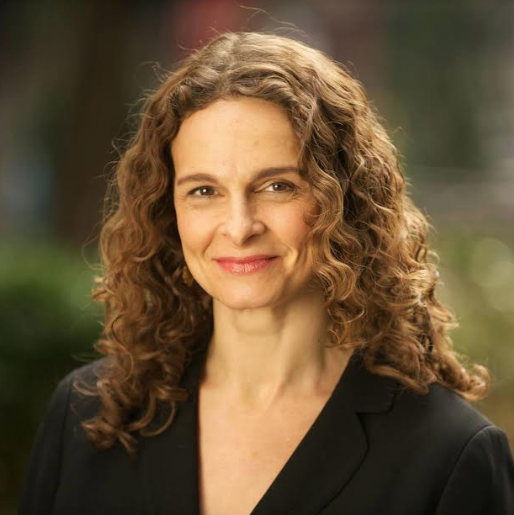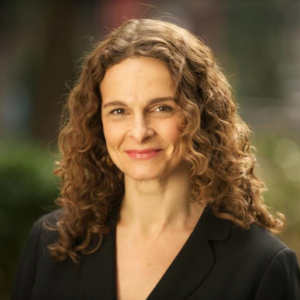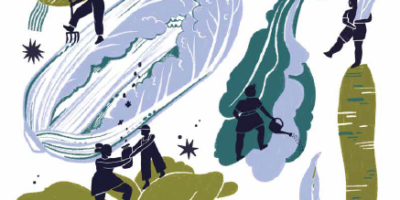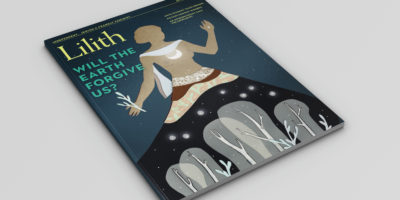
“Where the Hell Have I Been?”
Rabbi Jennie Rosenn on Eco-Feminism.

Rabbi Jennie Rosenn
In 2019, Rabbi Jennie Rosenn—a veteran of the Jewish nonprofit world—founded Dayenu: A Jewish Call to Climate Action. In March 2021, Steven Spielberg selected the organization, which has quickly sprung into the center of the vibrant climate justice movement, to receive a portion of his million-dollar Genesis Prize.
Arielle Silver-Willner: What drove you to start Dayenu?
Rabbi Jennie Rosenn: I once thought of “the environment” as out there, and was less viscerally connected than I was to people, to civil and human rights issues. But a lot of things contributed to my awakening.
I remember reading reports on the climate crisis and realizing that this was coming much faster and more furiously, and that terrified me. Without major change, climate collapse was going to happen in my lifetime! And the future for my children, let alone my grandchildren, was in peril. Would there be enough food to eat? Water to drink? Clean air to breathe? I felt like, “Where the hell have I been?! People have been talking about this for years. How did I not get it?”
At the time I was working with refugees, hearing their stories and witnessing their pain. Imagining that we could have a billion climate refugees if we don’t make massive change.
I also came to realize that the climate crisis, at its core, is an issue of social, economic, and racial justice—about who is bearing the brunt of climate change already, and who will be most severely impacted. Climate change affects everyone, but not equally. The impacts of the climate crisis rest disproportionately on those who have been historically marginalized: people living in the global south, in poverty, in particularly vulnerable areas, and people who experience racism and other kinds of bigotry. As I was integrating the reality of living in this moment of climate emergency, I was having conversations with friends and colleagues about how the Jewish community was not showing up, in all our people and power, to confront this crisis. We need all hands on deck.
I’ll be honest, I was not looking to start a new organization in my early 50s. I knew that launching a startup is risky and takes thick skin (which I don’t have), and I asked myself, “Am I up for this?” I thought, “No, I’m not…and I still need to do it.” We all need to do uncomfortable things.
This is an existential crisis upon which the future of humanity depends. What is at stake is nothing less than whether we will continue l’dor v’dor—generation to generation—and what kind of world we will have and what the lives of those generations will be.
How does feminism shape your work?
Climate change deepens existing inequalities. Heat waves, droughts, rising sea levels—really all climate disasters and all the subsequent devastation—disproportionately affect women, and women are left to deal with the aftermath. Women are also in a powerful position to work to build greater resiliency in response to a changing climate. And of course, many of the most powerful climate movements across the world are being led by women.
While personal practices like reducing meat consumption, and communal practices like greening institutions, are important and cultivate consciousness, even if every single person and institution significantly lowered their carbon footprint, we would not avoid the most catastrophic impacts of climate change. In the middle of April 2020, when more than half of the world was home-bound due to coronavirus, carbon dioxide emissions fell only around 17%. The other 83% of emissions are embedded deeply into our infrastructure and economy. To address that, we must make change on a systemic level.
What’s a specific example of structural change?
This means cutting demand for and supply of fossil fuel energy; advocating for comprehensive climate policy at the federal and state levels; moving our money; and changing our political landscape.
Electing a President who is committed to averting the worstof climate disaster is a critical start, but if we stop here, we will not, as we say in the High Holiday liturgy, “avert the severity of the decree.” At this point, it’s not about preventing climate change, because, as we can see, it is happening. The question is, “Can we avert the completely devastating scenario?” We need leaders and communities to raise up a moral voice for bold— not incremental—action. We need responses of great scale and speed.
We need to focus not on “What car do I buy?” but “What cars does Detroit manufacture?” Not just “Where do I bank?” but “Which of the biggest banks in the world are investing in fossil fuel and how do we take action on them?” This devastating time can and must be part of birthing a different world—one that is just and sustainable for all people for generations to come. The Jewish community must meet this moment of crisis with spiritual audacity and bold action.



